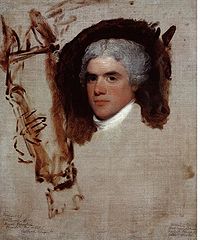Annotation:Leap Over the Garter
X:1 T:Leap Over the Garter M:2/4 L:1/8 R:Country Dance Tune N:"Perform'd by Mr. Rickets" N:Allegro B:John Watlen - The Celebrated Circus Tunes (Edinburgh, 1791, p. 16) Z:AK/Fiddler's Companion K:Bb f>g (f/e/d/c/)|BBBd|ce Ac|(B/A/B/c/) (B/c/d/e/)| f>g (f/e/d/c/)|BBBd|ce Ac|B2B2!End!:| |:dddf|ccce|df/d/ ec|A/B/c/A/ BF| dddf|ccce|df/d/ ec|f/=e/f/g/ f/_e/d/c/!D.C.!:|
LEAP OVER THE GARTER. English, Country Dance Tune (2/4 time). C Major (Harding): D Major (Aird). Standard tuning (fiddle). AB: AABB (Kirkpatrick). "Leap Over the Garter" was first published in John Watlen's Celebrated Circus Tunes (Edinburgh, 1791), a volume that references Edinburgh's Royal Circus, an extension of Phillip Astley's London-based Royal Circus. The circus provided an alternative entertainment to concerts, opera and the theater, where equestrian acts, acrobatics, song and dance, and pantomime were performed. Watlen notes that it was "perform'd by Mr. Rickets," one of several tunes in the volume that Watlen associates with the performances of John Bill Ricketts, the star equestrian performer of the Edinburgh circus during the 1790-1792 seasons.

In 1792, the the year after Watlen's publication, the Scots-born Ricketts emigrated to America, where he became a circus promoter himself and flourished through the 1790's till about 1800, when his Philadelphia enterprise was destroyed in a fire on Dec. 17, 1799. He reportedly delighted his audiences by dancing hornpipes on the backs of galloping horses (Tribe), and toward the end of his career hired another famous American hornpipe dancer, John Durang, to produce pantomimes for him. Alan Jabbour (in "American Fiddle Tunes") says that circuses under his name appeared in New York City, Philadelphia, Norfolk, Charlestown, Albany, Boston, Hartford, and Montreal. Thus we have a performing and circus connection with three of the most popular hornpipes of all time: "Astley's Hornpipe," "Rickett's Hornpipe" and "Durang's Hornpipe (1)." See Annotation:Rickett's Hornpipe for more.
"Leap Over the Garter" may well have to do with an equestrian circus trick, where a rider standing on a horse leaps over a string or garter, while the horse passes under it, to then land back atop standing atop of the horse. Since the horse and the performer are moving at the same speed, the performer only has to jump up, rather than up and forward, to clear the obstacle. George Smith was a dancer, acrobat and equestrian rider who flourished at the end of the 18th century and the beginning of the next. He was billed in a 1795 advertisement for the Royal Circus as "The First Equestrian Performer in the World". The advertisement further proclaimed:
He will Jump over Three Garters going once round the Ring, and take a surprising Leap through a Balloon, suspended in the air, Ten Feet high, and alight on the Saddle, on a Single horse, which is allowed to be the greatest Feat of Horsemanship ever attempted, and never performed by an other person.
